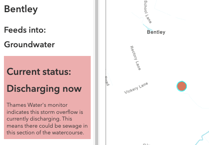The UK’s largest water company could avoid a massive fine for consistently releasing sewage into the Wey and other rivers around the South East.
Thames Water was threatened with a £104million fine from Ofwat last week for failing to ensure that discharges of untreated wastewater from storm overflows occur only in exceptional circumstances.
The firm has repeatedly released sewage into the Wey at Churt, Bentley and Farnham Park Tributary with the most recent discharge taking place at the latter on July 16 according to Sewage Map UK.
But it may escape a fine - the largest on record and roughly nine per cent of the company’s turnover - after allowing an independent monitor to access its records and report on progress.
The struggling firm was threatened with the fine for failing to manage or invest in sewage treatment plants, with 67 per cent found to have capacity or operational issues and 16 per cent of related storm overflows found to be in breach of permits.
Some of the rainwater gets mixed in with the foul water times of heavy or continued rainfall and is released into rivers, thus preventing sewer floods in homes, gardens and streets.
In May of this year, The Herald reported on multiple children becoming ill after spending time in the River Wey while there were multiple discharges across its basin in October 2023 following Storm Babet.
Although many campaigners would welcome a financial punishment, the firm’s well-documented problems mean that residents will be hit in the pocket regardless as its battles against potential collapse.
The company has been put into special measures and Ofwat will now have access to its financial information. The water company believes they only have enough money to survive until May 2025.
It seems residents’ pockets will bear the cost of the company’s mounting debt as a proposed new investment worth £19.8 billion to fix the issues would require a 40 per cent rise in customer bills.
This would mean the average annual bill could reach £608.30 by 2030 - or more than £50 a month.
Thames Water is keen to increase annual fees by £191 over the next five years but Ofwat has agreed to a maximum increase of £99 meaning the average bill would increase to £516 per annum.
Campaigners have concerns as many believe the money from bills is not being invested in upgrades will calls being made for a ban on executive bonuses.
More change could be coming to the sector as on Tuesday, August 6 Environment Secretary Steve Reed said: “I welcome Ofwat’s action today.
“The unacceptable destruction of our waterways should never have been allowed - and it is right that those responsible for illegally polluting our rivers, lakes and seas face the consequences.
“This government will fundamentally reform the water sector."
For residents near the River Wey change can’t come soon enough after years of tainted waterways.







Comments
This article has no comments yet. Be the first to leave a comment.